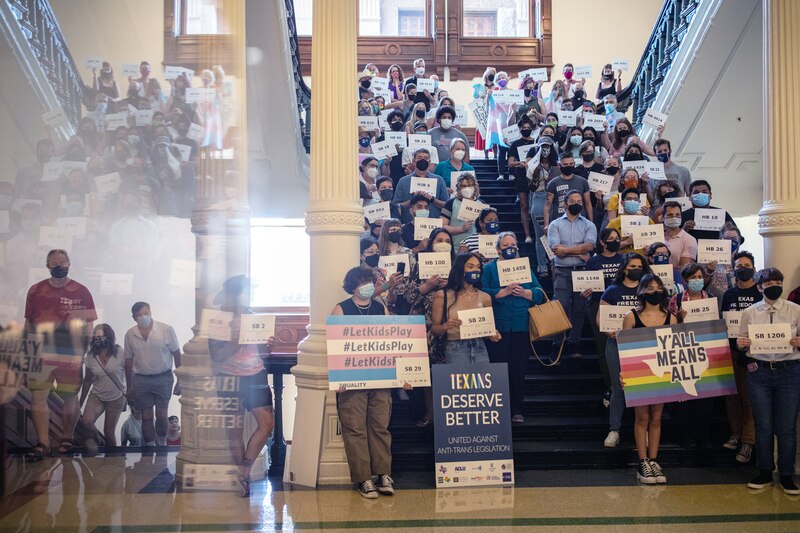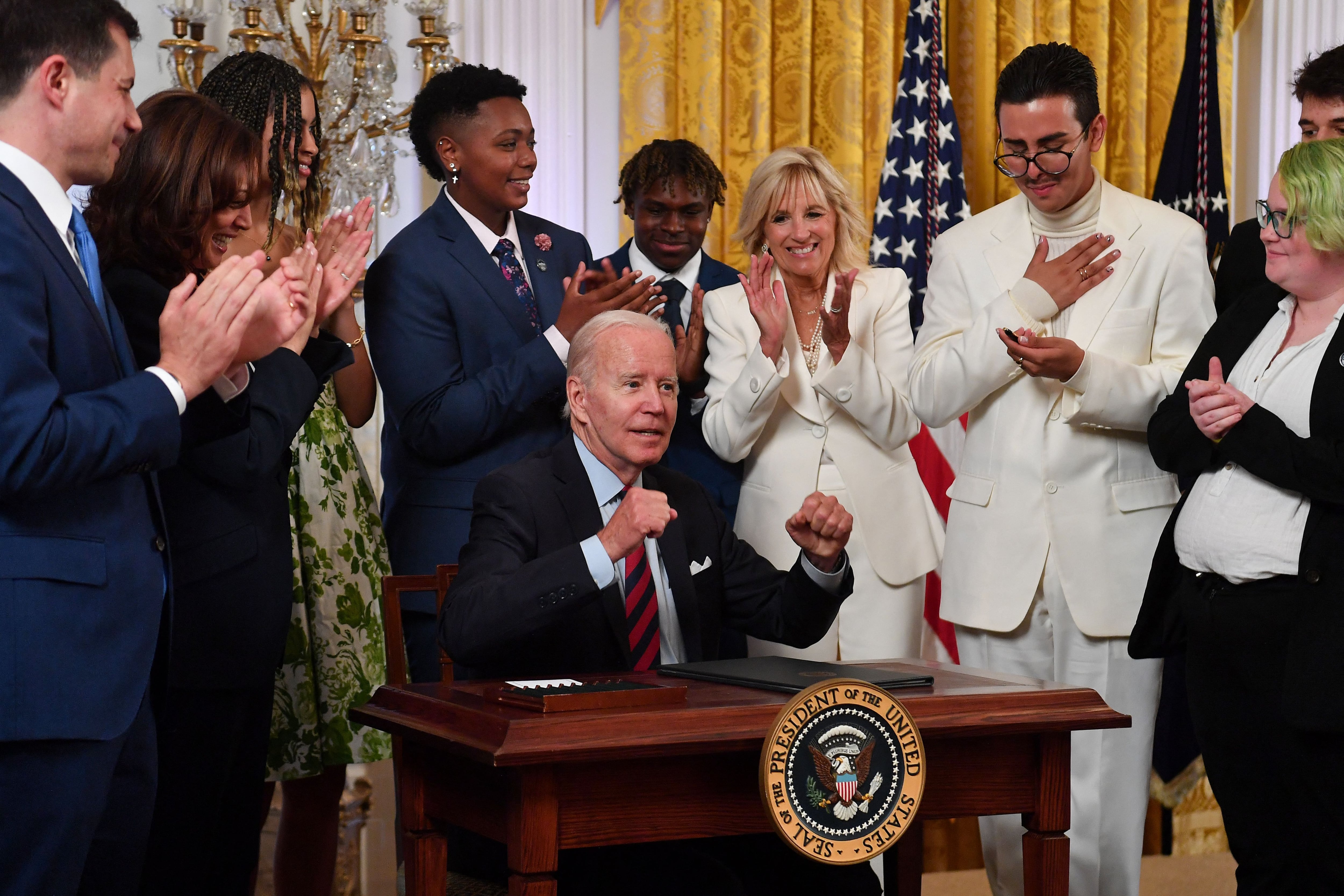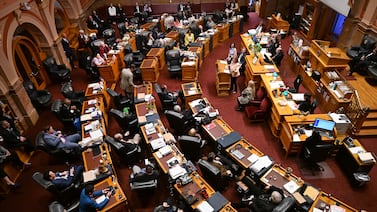The Biden administration and Republican lawmakers are locked in a rancorous battle over a high-stakes question: What rights do transgender students have?
Biden and other Democrats argue that federal civil rights law protects trans students, and schools must respect students’ gender identity. Republican legislators and governors in a growing number of states argue the exact opposite: Federal law doesn’t protect trans students, and school policies — covering everything from bathrooms to sports teams and pronouns — should stick to students’ sex assigned at birth.
The most recent round of this dispute began in June when President Joe Biden signed an executive order that the White House said will protect LGBTQ people from “harmful, hateful, and discriminatory attacks” by state legislatures.
“We’re in a battle for the very soul of this nation,” Biden said at the signing ceremony.
Shortly after, the U.S. education department proposed new rules to protect LGBTQ students from discrimination. Conservatives quickly slammed the proposed regulations as an example of Democrats’ “woke agenda,” and, last month, officials in Florida — a hotbed of the current culture wars — ordered school districts to ignore the guidance.
The Florida education department “will not stand idly by as federal agencies attempt to impose a sexual ideology on Florida schools,” state Education Commissioner Manny Diaz, Jr. wrote in a memo.
Republicans have seized on the clash over transgender rights as a way to galvanize voters in a midterm election year, but the debate is about much more than politics. State lawmakers have proposed hundreds of measures this year targeting LGBTQ Americans, and trans youth in particular, even as the federal government tries to cement protections for LGBTQ students.
The opposing efforts have set the stage for a monumental legal showdown, with the rights of transgender students hanging in the balance.
“There’s so much at stake,” said Alexis Rangel, policy counsel at the National Center for Transgender Equality. “It’s about being able to live our lives in a way that feels authentic and to share our true selves with the people around us.”
As this fast-moving conflict unfolds, here’s a guide to how it started and where it’s headed next.
A showdown years in the making
The current standoff is the culmination of a yearslong cat-and-mouse game between federal officials and state lawmakers over LGBTQ rights.
In 2016, North Carolina passed a law that limited transgender people’s access to bathrooms in schools and other public facilities, provoking a nationwide backlash.
Less than two months later, the Obama administration issued guidance saying that Title IX, the landmark civil rights law that prohibits sex-based discrimination in federally funded schools, also applies to gender identity. Schools must allow transgender students to participate in sports, adopt pronouns, and use bathrooms “consistent with their gender identity,” the guidance said.
In 2017, former President Trump rescinded the guidance. That year, at least 15 states introduced bathroom restrictions targeting transgender students and adults.
Subsequent measures moved beyond bathrooms. Arguing that LGBTQ-inclusive books and lessons push students to question their identities, Republicans in several states introduced legislation prohibiting classroom discussions about gender or sexual orientation in certain grades. Florida and Alabama passed such laws this year.
Other laws impose restrictions directly on transgender students, banning them from locker rooms and sports teams that match their gender identity. A new law in Tennessee will withhold funding from schools that fail to enforce the state’s restriction on trans athletes.
“Regardless of the radical propaganda being pushed by the left, God created men and women differently from a physical standpoint, and that’s a biological fact,” Republican Sen. Marsha Blackburn of Tennessee told Fox News Digital.
After Biden took office in 2021, federal officials reiterated that Title IX does protect LGBTQ students and said federal agencies would investigate reports of discrimination, such as a school excluding a transgender girl from a girls team or bathroom.
Yet some state legislatures ignored the warning. This year, two more states passed school bathroom laws and eight more passed restrictions on transgender student-athletes.
“This is part of the traditional push-pull of civil rights advancements,” said Elizabeth Meyer, an associate professor at the University of Colorado Boulder who has written about transgender students. “When you see advancements and you see more people being visible and standing up and demanding recognition and support, then you see the pushback and the backlash.”
Biden’s bid to protect trans students
President Biden has vowed to defend LGBTQ Americans, whose rights he says “are under relentless attack.”
On his first day in office, Biden signed an executive order directing federal agencies to combat discrimination against LGBTQ people, including in schools. “Children should be able to learn without worrying about whether they will be denied access to the restroom, the locker room, or school sports,” read the January 2021 order.

The justice and education departments followed up with guidance stating that Title IX forbids discrimination based on gender identity and sexual orientation. The agencies based their interpretation of the law on a 2020 Supreme Court ruling that said the federal statute prohibiting workplace discrimination also protects LGBTQ employees.
The administration is in the process of turning its Title IX interpretation into a formal rule, which would be harder to overturn than non-binding guidance, hold more weight in court, and strengthen federal agencies’ enforcement power.
States like Florida that have rejected Biden’s Title IX guidance would find it harder to flout a regulation, said Suzanne Eckes, an education law professor at the University of Wisconsin-Madison.
“Once the formal rule-making process is complete,” she said, “good luck.”
Meanwhile, the Education Department under Biden has investigated complaints of harassment and discrimination against LGBTQ students. And the Justice Department has backed legal challenges to several anti-LGBTQ state laws, including one in West Virginia that prohibits transgender girls from competing on female sports teams.
“The United States has a significant interest in ensuring that all students, including students who are transgender, can participate in an educational environment free of unlawful discrimination,” the agency wrote.
States attack federal ‘overreach’
At every turn, Republican-dominated states have resisted the Biden administration’s efforts.
Last year, a group of 20 state attorneys general sued the U.S. Education Department and another agency, challenging the guidance that said federal anti-discrimination laws protect transgender people. The lawsuit called the guidance an “overreach” that infringed upon states’ right to legislate thorny issues, such as whether trans girls can compete on girls sports teams.
The federal agencies “have no authority to resolve those sensitive questions, let alone to do so by executive fiat without providing any opportunity for public participation,” the lawsuit said.
Last month, a Trump-appointed federal judge sided with the attorneys general, temporarily blocking enforcement of the federal guidance in those states.
Some of the same attorneys general filed a complaint last month challenging a similar directive issued by the Agriculture Department.
The Education Department’s proposed Title IX changes must still be finalized, and officials are considering separate changes related to school sports. But once the new rules are adopted, they almost certainly will be challenged in court.
In a letter to the U.S. education secretary in June, 18 conservative state attorneys general said that using Title IX to also protect transgender people from discrimination “is an attack on the rights of girls and women.”
“[W]e will fight your proposed changes to Title IX with every available tool in our arsenal,” they wrote.
The courts step in
The courts have become a key battleground in the clash over transgender students’ rights — and are the venue where the issue will most likely be settled.
Trans students in several states have gone to court to fight athletic restrictions. In Idaho, a college track and cross-country runner filed a lawsuit in 2020 challenging the state’s ban on transgender athletes in kindergarten through college from competing on female sports teams. A federal judge agreed to block enforcement of the law while litigation continues.
A federal judge in West Virginia temporarily halted that state’s law after advocates sued on behalf of an 11-year-old transgender girl who was stopped from joining girls sports teams.
“The right not to be discriminated against by the government belongs to all of us in equal measure,” the judge wrote.
Similar court cases are pending in Florida, Indiana, Tennessee, and Utah.
Other lawsuits have taken aim at school bathroom policies. In at least 11 cases in state or federal courts, transgender students have challenged policies that prevent them from using bathrooms or locker rooms consistent with their gender identity, according to Eckes, the education law professor, who has tracked the litigation. In each case, the students prevailed.
“These judges run the gamut in terms of ideology,” said Sarah Warbelow, legal director for the Human Rights Campaign, a national LGBTQ advocacy group. Yet “they keep coming to the same conclusion: that it’s a violation of federal law and the U.S. Constitution to discriminate against transgender students.”
The Supreme Court is expected to eventually weigh in on the question of transgender students’ rights. But experts say that might not happen for years, leaving lower courts across the country to issue potentially contradictory rulings.
There’s a “tremendous opportunity for conflict, for uncertainty, for quite an extended period of time,” said R. Shep Melnick, a politics professor at Boston College.
Schools stuck in the middle
For now, schools are caught in the legal and political crossfire.
On July 1, the day Florida schools were to begin enforcing the state’s new ban on lessons about sexuality or gender in grades K-3, Biden’s press secretary called the law “discrimination” and urged families to file civil rights complaints if necessary. Florida’s education commissioner shot back later that month, warning districts that they “risk violating Florida law” if they act on federal guidance related to LGBTQ students.
At a recent event, Catherine Lhamon, the head of the U.S. education department’s Office for Civil Rights, was asked how schools should navigate the conflicting messages. She noted that federal law takes precedence over state law when the two are opposed.
“So a discriminatory state law is no defense to a federal legal civil rights violation,” Lhamon said at the Education Writers Association conference in Orlando. “Full stop.”
It’s true that Title IX would trump state laws like Florida’s, Melnick said — if, as the Biden administration argues, the federal anti-discrimination law applies to LGBTQ students.
“But here’s the big caveat,” he said. “Would courts agree that this is a valid interpretation of the federal law?”
If the administration’s proposed Title IX regulation is finalized and upheld by the courts, the education department could withhold funding from states with laws that violate the rule, said Shep, who has written a book about Title IX. But considering the agency has never cut off funding due to a Title IX violation, that would be a drastic move, he added.
A more likely scenario, he said, is that the department’s Office for Civil Rights will investigate complaints of discrimination against students based on their sexual orientation or gender identity, which the office considers a violation of Title IX. In response, a school might agree to change its practices even if doing so contradicts state law.
“If the OCR is dealing with schools that are sympathetic to their point of view and dubious about state law,” Shep said, “then they can probably negotiate agreements.”
Warbelow, of the Human Rights Campaign, said a school district could even sue the state over a law it considers discriminatory.
“So there really are options for schools that are caught in this untenable situation,” she said. “They can stand by their transgender students.”
Patrick Wall is a senior reporter covering national education issues. Contact him at pwall@chalkbeat.org.







